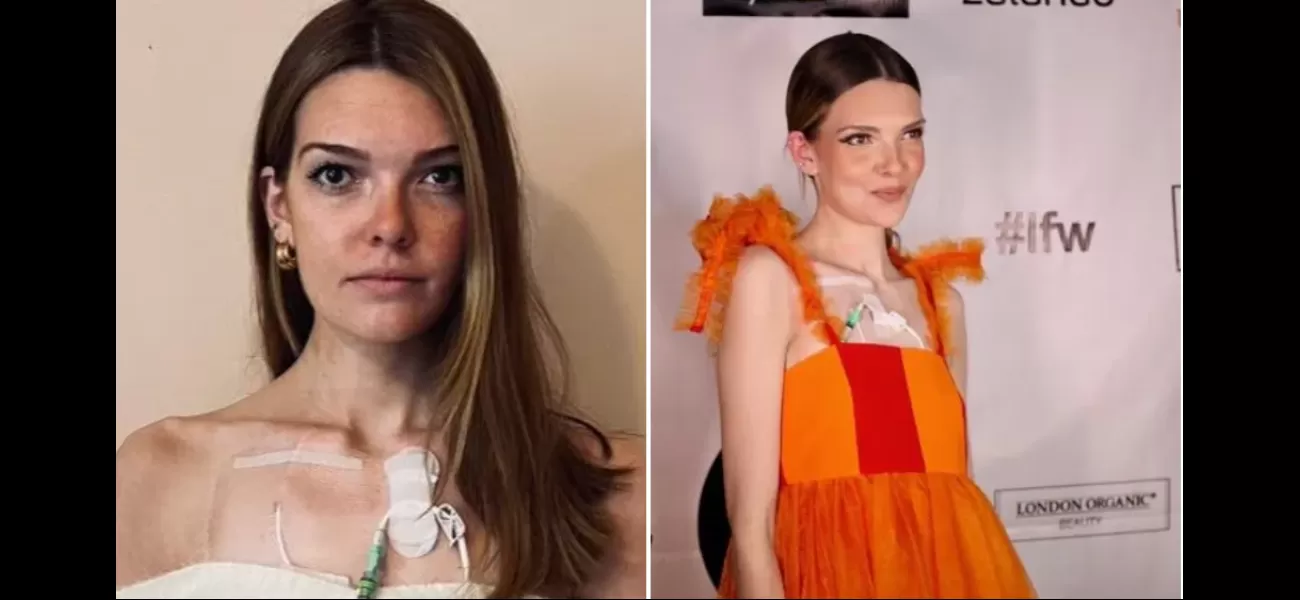Dream job offer rescinded after disclosing disability.
January 3rd 2024.

I was initially elated. As I left the job interview for the first stepping stone into my legal career, the employer shook my hand, winked, and said, ‘I expect we shall see each other again very soon.’
I was elated – everything I had worked so hard for, committing myself to my school work, going on to study law at university, was finally coming to fruition.
Then came the email. ‘Congratulations! Please find attached our diversity and inclusion forms for employees.’
I ticked that I identify as disabled and needed reasonable adjustments, then sent it back, not thinking too much about it.
Days later, I received a phone call from the interviewer, saying that they wanted to know more about my disability. Happy to oblige, I explained and talked through the adjustments I needed – access to an accessible bathroom, permission to carry sharps and an agreement around attending medical appointments.
After a long pause, the interviewer's tone shifted. The call was hurried to a monotoned finish. That same day, I received an email that they no longer thought I was suited to the role and had chosen another applicant. They didn’t believe, the email stated, I was going to fit in with the team dynamic because I was ‘different’, and they weren’t able to offer adjustments.
Why did they send over the forms if they weren’t willing to actually go through with the adjustments? Was it a tick-box exercise? Or that they could only cope with less severe health complications?
I was devastated and defeated. At that moment, I hated who I was, because I felt like their decision was based purely on ableism.
Unfortunately, this is the reality of employment for disabled people. I was born with a genetic abnormality called Loeys-Dietz Syndrome, a genetic condition that weakens the body’s connective tissue that has numerous life-threatening complications.
This means that every single one of my organs, muscles, tendons, bones, and tissue is weak, undeveloped, or failing. There is no cure, and my body has been consequentially ravaged by multiple disabilities such as gastroparesis, multiple organ failure, POTS, heart failures and immobility, with the list of what works countable on one hand.
I have battled it all, but – despite hospital appointments, daily blood infusions, and chronic pain – I am still a person with capabilities and talents just like everybody else. I may do things differently, but different shouldn’t mean wrong.
The experience that I had with this employer is not unique. I’ve faced similar situations more than once, and, after speaking with disabled friends, I know I am not alone.
As soon as you mention words like ‘disabled’ or ‘neurodiverse’, we become stereotyped. They ignore the facts – and the person – before them.
Even if we do finally get our foot through the door, the challenges for disabled people in the workplace don’t stop there. I have been humiliated and ostracised at work because I am disabled. Told that I don’t belong with the team. That I am only there to tick a diversity box. Been given menial tasks because they didn’t believe I could keep up with everybody else.
So tired of the barriers of being disabled in business, undervalued, mistreated and without access to reasonable adjustment, I finally told myself that enough was enough. Taking the biggest risk of my life, I left formal employment and decided I was going to work for myself, championing the removal of discrimination wherever I could.
Today, I am a multi-award-winning campaigner, lobbyist, investor, and policy designer. I work closely with organisations, charities, and governments, advocating for improved equity of representation, inclusivity, accessibility, and opportunities for disabled people. I am also the co-founder of the first policy unit in the UK that focuses on putting disability at the heart of Westminster called The Disability Policy Centre and Access2Funding, which transforms and the opportunities and outcomes for disabled entrepreneurs.
I am incredibly proud of the work I have done to help shape the world for disabled people, around political representation, SEND education, business and the accessibility of the facilities around us.
The barriers for disabled people in employment are rife. We are misunderstood, seen as risky rather than talented, and we have our capabilities judged on our health, not skills.
On top of that, accessibility barriers – virtually and physically – run rampant alongside stereotypes about who we are. Over 25% of small businesses in the UK are owned by someone with a disability or health condition and – as of 2020 – the spending power of disabled people and their household is estimated to be worth £274billion per year.
The responsibility to eradicate ableism and improve outcomes is on all of us – as both employees or employers. We must transform the opportunities and outcomes for disabled people, creating an equal playing field. A disabled person must be perceived as equal value, worth, talent and ability as a person without a disability. They must be treated in the same non-discriminatory manner and receive fair treatment, process and management as a person without a disability.
Accessibility is a right, not a privilege. We must create more opportunities for participation, eradicate ableism and foster environments where disabled people feel recognised and valued.
To the employer who turned me away because of my disability, I say this: Disability does not equal less ability. Nobody should experience these kinds of situations of discrimination based on any element of their identity. Your misconceptions, stereotyping and stigma of disabled people has to end.
So, let's work together to create a world where disabled people are given fair and equal opportunities. Where they are respected, accepted, and celebrated. Where disability is no longer seen as a disadvantage, but as a unique advantage.
Let's promote the understanding that disabled people are not lesser than. That they can do the same job as everyone else and, in some cases, even better. That they have the same rights, wants, needs, and desires as anybody else.
Let’s create a society where disabled people can thrive and realise their full potential.
We all have an obligation to create a world where disabled people are given a fair and equal chance to succeed. We have to open our eyes to the fact that it’s not just disabled people who can benefit from an accessible and equitable society – it’s all of us.
I was elated – everything I had worked so hard for, committing myself to my school work, going on to study law at university, was finally coming to fruition.
Then came the email. ‘Congratulations! Please find attached our diversity and inclusion forms for employees.’
I ticked that I identify as disabled and needed reasonable adjustments, then sent it back, not thinking too much about it.
Days later, I received a phone call from the interviewer, saying that they wanted to know more about my disability. Happy to oblige, I explained and talked through the adjustments I needed – access to an accessible bathroom, permission to carry sharps and an agreement around attending medical appointments.
After a long pause, the interviewer's tone shifted. The call was hurried to a monotoned finish. That same day, I received an email that they no longer thought I was suited to the role and had chosen another applicant. They didn’t believe, the email stated, I was going to fit in with the team dynamic because I was ‘different’, and they weren’t able to offer adjustments.
Why did they send over the forms if they weren’t willing to actually go through with the adjustments? Was it a tick-box exercise? Or that they could only cope with less severe health complications?
I was devastated and defeated. At that moment, I hated who I was, because I felt like their decision was based purely on ableism.
Unfortunately, this is the reality of employment for disabled people. I was born with a genetic abnormality called Loeys-Dietz Syndrome, a genetic condition that weakens the body’s connective tissue that has numerous life-threatening complications.
This means that every single one of my organs, muscles, tendons, bones, and tissue is weak, undeveloped, or failing. There is no cure, and my body has been consequentially ravaged by multiple disabilities such as gastroparesis, multiple organ failure, POTS, heart failures and immobility, with the list of what works countable on one hand.
I have battled it all, but – despite hospital appointments, daily blood infusions, and chronic pain – I am still a person with capabilities and talents just like everybody else. I may do things differently, but different shouldn’t mean wrong.
The experience that I had with this employer is not unique. I’ve faced similar situations more than once, and, after speaking with disabled friends, I know I am not alone.
As soon as you mention words like ‘disabled’ or ‘neurodiverse’, we become stereotyped. They ignore the facts – and the person – before them.
Even if we do finally get our foot through the door, the challenges for disabled people in the workplace don’t stop there. I have been humiliated and ostracised at work because I am disabled. Told that I don’t belong with the team. That I am only there to tick a diversity box. Been given menial tasks because they didn’t believe I could keep up with everybody else.
So tired of the barriers of being disabled in business, undervalued, mistreated and without access to reasonable adjustment, I finally told myself that enough was enough. Taking the biggest risk of my life, I left formal employment and decided I was going to work for myself, championing the removal of discrimination wherever I could.
Today, I am a multi-award-winning campaigner, lobbyist, investor, and policy designer. I work closely with organisations, charities, and governments, advocating for improved equity of representation, inclusivity, accessibility, and opportunities for disabled people. I am also the co-founder of the first policy unit in the UK that focuses on putting disability at the heart of Westminster called The Disability Policy Centre and Access2Funding, which transforms and the opportunities and outcomes for disabled entrepreneurs.
I am incredibly proud of the work I have done to help shape the world for disabled people, around political representation, SEND education, business and the accessibility of the facilities around us.
The barriers for disabled people in employment are rife. We are misunderstood, seen as risky rather than talented, and we have our capabilities judged on our health, not skills.
On top of that, accessibility barriers – virtually and physically – run rampant alongside stereotypes about who we are. Over 25% of small businesses in the UK are owned by someone with a disability or health condition and – as of 2020 – the spending power of disabled people and their household is estimated to be worth £274billion per year.
The responsibility to eradicate ableism and improve outcomes is on all of us – as both employees or employers. We must transform the opportunities and outcomes for disabled people, creating an equal playing field. A disabled person must be perceived as equal value, worth, talent and ability as a person without a disability. They must be treated in the same non-discriminatory manner and receive fair treatment, process and management as a person without a disability.
Accessibility is a right, not a privilege. We must create more opportunities for participation, eradicate ableism and foster environments where disabled people feel recognised and valued.
To the employer who turned me away because of my disability, I say this: Disability does not equal less ability. Nobody should experience these kinds of situations of discrimination based on any element of their identity. Your misconceptions, stereotyping and stigma of disabled people has to end.
So, let's work together to create a world where disabled people are given fair and equal opportunities. Where they are respected, accepted, and celebrated. Where disability is no longer seen as a disadvantage, but as a unique advantage.
Let's promote the understanding that disabled people are not lesser than. That they can do the same job as everyone else and, in some cases, even better. That they have the same rights, wants, needs, and desires as anybody else.
Let’s create a society where disabled people can thrive and realise their full potential.
We all have an obligation to create a world where disabled people are given a fair and equal chance to succeed. We have to open our eyes to the fact that it’s not just disabled people who can benefit from an accessible and equitable society – it’s all of us.
[This article has been trending online recently and has been generated with AI. Your feed is customized.]
[Generative AI is experimental.]
0
0
Submit Comment





